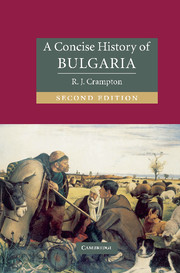Book contents
- Frontmatter
- Contents
- List of illustrations
- Preface
- Preface to the second edition
- Note on transliteration
- The Bulgarian lands: main rivers and mountains
- 1 THE BULGARIAN LANDS FROM PREHISTORY TO THE ARRIVAL OF THE BULGARIANS
- 2 MEDIAEVAL BULGARIA, 681–1393
- 3 OTTOMAN RULE IN THE BULGARIAN LANDS
- 4 THE NATIONAL REVIVAL AND THE LIBERATION
- 5 THE CONSOLIDATION OF THE BULGARIAN STATE, 1878–1896
- 6 FERDINAND'S PERSONAL RULE, 1896–1918
- 7 BULGARIA, 1918–1944
- 8 BULGARIA UNDER COMMUNIST RULE, 1944–1989
- 9 POST-COMMUNIST BULGARIA
- CONCLUSION
- Appendix 1 Bulgarian monarchs
- Appendix 2 Prime ministers of Bulgaria, 1879–2004
- Suggestions for further reading
- Index
- CAMBRIDGE CONCISE HISTORIES
4 - THE NATIONAL REVIVAL AND THE LIBERATION
Published online by Cambridge University Press: 05 June 2012
- Frontmatter
- Contents
- List of illustrations
- Preface
- Preface to the second edition
- Note on transliteration
- The Bulgarian lands: main rivers and mountains
- 1 THE BULGARIAN LANDS FROM PREHISTORY TO THE ARRIVAL OF THE BULGARIANS
- 2 MEDIAEVAL BULGARIA, 681–1393
- 3 OTTOMAN RULE IN THE BULGARIAN LANDS
- 4 THE NATIONAL REVIVAL AND THE LIBERATION
- 5 THE CONSOLIDATION OF THE BULGARIAN STATE, 1878–1896
- 6 FERDINAND'S PERSONAL RULE, 1896–1918
- 7 BULGARIA, 1918–1944
- 8 BULGARIA UNDER COMMUNIST RULE, 1944–1989
- 9 POST-COMMUNIST BULGARIA
- CONCLUSION
- Appendix 1 Bulgarian monarchs
- Appendix 2 Prime ministers of Bulgaria, 1879–2004
- Suggestions for further reading
- Index
- CAMBRIDGE CONCISE HISTORIES
Summary
The vûzrazhdane, or national revival, is a phenomenon in which the Bulgarians take considerable and justifiable pride. As a historic process the revival was long and complicated with economic, social, cultural and psychological factors interweaving in intriguing and complex patterns. The first calls for a cultural revival were made by a small number of ‘awakeners’ in the eighteenth and very early nineteenth centuries, but though they saw the need for a revival they had no concept of what form it might take. The cultural revival, when it did take place, was made possible by the profound economic, social and political changes which overcame the Ottoman empire in the eighteenth and early nineteenth centuries. The manner in which the cultural revival was transformed into a national revival with its own institutions, first ecclesiastical and then political, was the work of the activists who emerged from the economic recovery and the cultural revival.
THE AWAKENERS
The seminal work of the Bulgarian national revival was that of Paiisi, a monk in the monastery of Hilendar on Mount Athos. Paiisi Hilendarski was born in the town of Bansko in 1722. In 1745 he entered Hilendar where after a few years he became a taxidiot and as such travelled around the Bulgarian lands on monastery business. His travels left a deep impression of the tribulations of the ordinary people and of the inferior status of the Bulgarians vis-à-vis the Greeks.
- Type
- Chapter
- Information
- A Concise History of Bulgaria , pp. 45 - 84Publisher: Cambridge University PressPrint publication year: 2005



